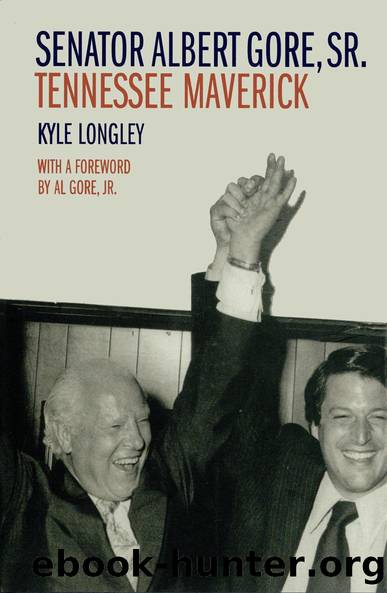Senator Albert Gore, Sr. by Kyle Longley

Author:Kyle Longley [Longley, Kyle]
Language: eng
Format: epub
ISBN: 9780807129807
Barnesnoble:
Publisher: Louisiana State University Press
Published: 2004-10-25T00:00:00+00:00
7 IN THE MIDST OF THE GREAT SOCIETY AND BEYOND
DISILLUSIONMENT AND DESPAIR enveloped the country following Kennedyâs assassination. Like so many of his countrymen, a distraught Gore worried about the nation and its future. He wrote Lyndon Johnson about his concern, telling him that âyou have my prayers and best wishes. May God be with you and the Country through your leadership.â The Texan soon responded that ânothing has meant more to me during these hours of sorrow after the death of President John Fitzgerald Kennedy than the messages from friends like you. I appreciated your thoughtfulness. I shall cherish your prayers in the days ahead.â1
For the moment, the two men set aside their animosity. Over the next five years, JohnsOn and Goreâs complex relationship continued to mature. They could cooperate on issues such as Medicare, voting rights, and economic development. Just as easily, however, they would clash over taxes, interest rates, and Vietnam. Still, both would agree that the events during the Johnson administration were among the most notable in American history. While the liberal and progressive agenda made substantial advances, especially during the first three years, by 1968 the coalition appeared in retreat in the face of a conservative backlash. By the end of Johnsonâs term, Gore found himself trying to stay ahead of the wave that would consume Johnson, Hubert Humphrey, and the Democratic Party and bring to the forefront his old nemesis, Richard Nixon.
Despite the cordial messages Johnson and Gore exchanged following Kennedyâs death, almost immediately Gore took issue with the administration over the tax cut initially proposed by Kennedy. Goreâs opposition to it frustrated the White House. Treasury officials complained that they had addressed his concerns on expense accounts, stock options, and foreign income; one stressed that âit is my opinion that Senator Gore will never be convinced of the merits of this bill. Even if he were convinced, he seems to have locked himself into a political posture in Tennessee that he cannot readily abandon.â2
In response, Johnson told Treasury Secretary Douglas Dillon that he wanted to put the heat on Gore, encouraging him to inform Katherine Graham at the Washington Post about Goreâs delaying actions. He wanted someone âfor Godâs sakeâ to get up on Capitol Hill and âtake pictures of Gore talking all morning. At least put a little heat there because heâs going to keep it up if you donât.â3
Most in the administration agreed that Gore was a lost cause even as Johnson launched a full court press to win approval. He told an audience of businessmen in Denver that âI need [the tax cut] now ⦠I am the only President you have. If you would have me fail, then you fail, for this Nation of yours fails. If you would have me succeed, then you benefit, and the country benefits.â Johnson prodded Senator Eugene McCarthy (D-MN), telling him to get the Democrats on the Finance Committee to âattend the meetings, make them keep their mouths shut, make them vote down amendments, and get me a bill out on the floor.
Download
This site does not store any files on its server. We only index and link to content provided by other sites. Please contact the content providers to delete copyright contents if any and email us, we'll remove relevant links or contents immediately.
Wondrous Transformations by Alison Li(760)
Madame Figaro by 27 Janvier 2023(643)
William Tryon and the Course of Empire by Paul David Nelson(452)
If Wishes Were Coffee by Moore Michelle(427)
Tabloid Love by Bridget Harrison(417)
Growing Up Underground by Steven Heller(392)
Against All Odds by Alex Kershaw(390)
Jacob H. Schiff by Naomi W. Cohen(372)
Nephew by M.K. Asante(358)
Against All Odds: A True Story of Ultimate Courage and Survival in World War II by Kershaw Alex(354)
Bronx by Jerome Charyn(337)
From Loyalists to Loyal Citizens by Valerie H. McKito(334)
The Missionary of Wall Street: From Managing Money to Saving Souls on the Streets of New York by Stephen F. Auth(334)
Working on the Dock of the Bay by Michael D. Thompson(331)
Crossing Highbridge by Waters Maureen;(331)
Beware of Limbo Dancers by Reed Roy;(329)
Growing Up with Clemente by Peterson Richard;(312)
Pioneer Mother by Hillary Brown(311)
Studying Wisconsin by Martha Bergland & Paul G. Hayes(306)
